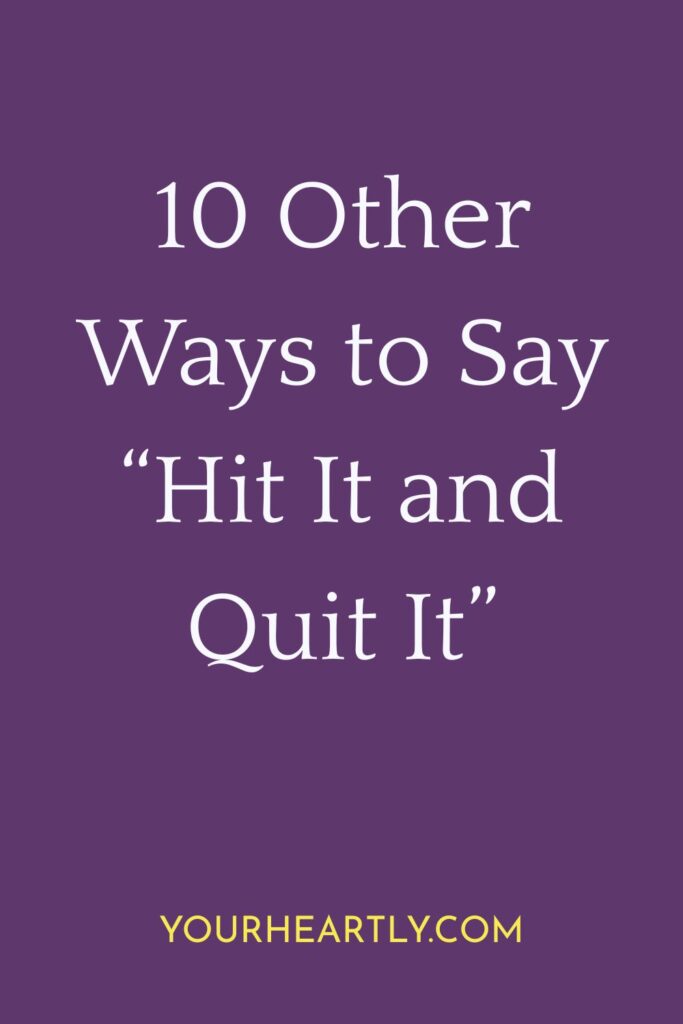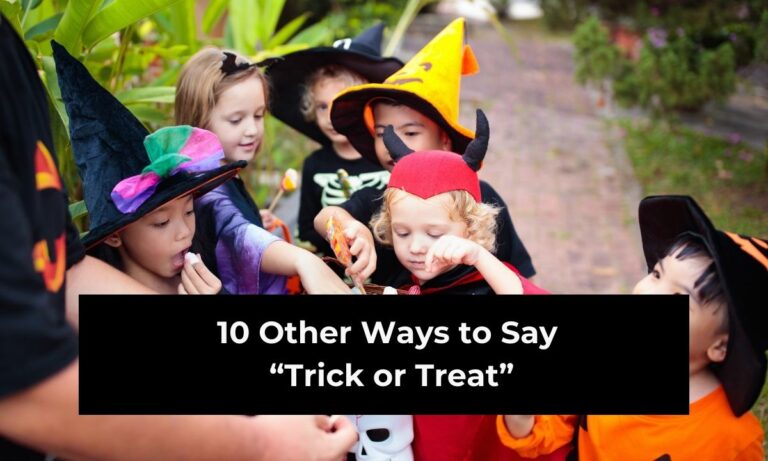You’ve probably heard the phrase “hit it and quit it” before. It’s a casual and often blunt way of describing a one-night stand or a short-lived romantic encounter that isn’t meant to turn into anything serious. While this expression is widely recognized, it can sound crude, dismissive, or simply not the vibe you want when you’re trying to express yourself.
Maybe you’re talking with friends and want a lighter, more playful way to phrase it. Or maybe you’re writing a story, blog post, or even just sending a cheeky message, and you want something less harsh and a bit more creative. That’s where finding alternatives becomes really helpful.

In this article, you’ll discover 10 other ways to say “hit it and quit it.” Each option comes with a bit of context so you can decide when and how to use it. Some of these expressions lean on humor, others have a subtle or witty tone, and a few just soften the idea so it doesn’t sound as brash.

Think of this as your personal phrase toolkit. Whether you’re chatting, writing, or just curious about different slang expressions, you’ll walk away with better, smarter ways to say what you mean. The best part? You’ll sound clever, confident, and adaptable in any conversation.
Let’s dive in and explore these 10 creative alternatives.
1. A One-Night Stand
When you want a straightforward phrase that nearly everyone understands, “a one-night stand” is the go-to alternative. It captures the same meaning as “hit it and quit it” but sounds more neutral and less abrasive.
You’ve probably heard it in movies, conversations, and even in casual writing. It implies intimacy that’s meant for just one night, without any expectation of building a relationship afterward. This phrase works well when you want clarity without the crude edge.
For example, if you’re chatting with a friend about a night out, you might say: “It wasn’t anything serious, just a one-night stand.” People immediately get what you mean without needing further explanation.
The best part about using “one-night stand” is that it has become almost universally accepted, so you don’t have to worry about shocking or offending someone. It’s also versatile enough to use in both casual and semi-formal conversations.
If you’re writing a blog, story, or even a social post, this phrase slips in naturally and keeps the tone clear. It’s descriptive without being over the top, which makes it a reliable alternative to the harsher “hit it and quit it.”
2. A Fling
If you want something light and playful, “a fling” is perfect. Unlike “hit it and quit it,” which feels abrupt, “a fling” suggests a fun, short-lived connection that may last for a night, a week, or even a summer.
This phrase softens the concept and adds a touch of excitement. A fling feels more adventurous and romantic than transactional. For instance, you might say: “We had a little fling during college,” and it immediately paints a picture of carefree fun.
“A fling” doesn’t carry as much judgment either. It can even sound nostalgic when you’re looking back at old experiences. Unlike “hit it and quit it,” which has a dismissive tone, “a fling” leans more on the side of fondness and playfulness.
If you’re writing a story or article, “a fling” works beautifully to capture the idea of temporary passion without sounding crude. Readers instantly connect with the word and understand the context. It’s versatile, friendly, and easy to use in conversation without raising eyebrows.
So, when you want to tone things down and make it sound more carefree, “a fling” is a solid choice.
3. A Quick Hookup
Sometimes, you just need a phrase that’s direct and to the point. “A quick hookup” is exactly that. It’s casual, clear, and carries the same idea as “hit it and quit it” without the dismissive vibe.
This expression works well in modern conversations because “hookup culture” is something a lot of people understand. Adding the word “quick” emphasizes that it was a short encounter with no strings attached.
For example, you might say: “It was just a quick hookup after the party,” and no one would be confused about what you meant. The tone here is simple and conversational, making it easy to drop into everyday talk.
What’s nice about “a quick hookup” is that it’s approachable. It doesn’t sound overly dramatic or romanticized—it just states the fact. You can use it in storytelling, casual chats, or even in writing without it sounding offensive.
If you’re trying to balance honesty with a more socially acceptable phrase, “a quick hookup” is a reliable choice.
4. A Brief Encounter
For a softer, more sophisticated spin, “a brief encounter” works beautifully. Unlike slang terms that might sound harsh or casual, this phrase has a more elegant and almost cinematic quality.
When you say “a brief encounter,” it sounds like a fleeting moment of passion or connection that didn’t last. It doesn’t necessarily reduce the experience to just physical intimacy—it can hint at something more, while still emphasizing the temporary nature.
For example: “We shared a brief encounter while traveling.” This phrasing feels more polished and classy, making it great for writing, storytelling, or any time you want a gentler tone.
This phrase works especially well if you’re writing about personal experiences in a reflective or creative way. It avoids the crudeness of “hit it and quit it” and replaces it with something more subtle.
If you want to keep the mood elegant and understated, “a brief encounter” is an excellent alternative.
5. A Casual Thing
When you don’t want to make a big deal out of it, “a casual thing” is a simple yet effective phrase. It tells someone that the encounter wasn’t serious and that it didn’t carry long-term expectations.
For example: “We had a casual thing for a little while.” It’s vague enough to soften the details but still communicates the temporary nature of the relationship.
“A casual thing” is also versatile. You can use it for situations that lasted one night or even a few weeks, as long as it didn’t develop into anything more. It takes the edge off and makes the situation sound laid-back.
This phrase is great when you’re talking with friends or writing in a conversational style. It doesn’t sound judgmental or dismissive—it just acknowledges what happened without overemphasizing it.
So, if you’re looking for an alternative that feels easygoing and relatable, “a casual thing” is a strong choice.
6. No Strings Attached
This phrase has become almost iconic when describing encounters without commitment. Saying “no strings attached” communicates the idea that both people went into it with clear expectations—it wasn’t meant to lead to anything more.
For example: “It was just fun, no strings attached.” This phrase works because it’s casual but not harsh. It highlights the agreement or understanding between both people, making it sound mutual rather than one-sided.
What makes “no strings attached” appealing is that it can even sound responsible. It implies that boundaries were set and respected, which makes it less dismissive than “hit it and quit it.”
You’ll often see this phrase used in modern dating apps, conversations, and even TV shows, which means most people will instantly recognize and understand it.
If you want something casual yet clear, “no strings attached” is one of the best alternatives out there.
7. A Short-Lived Romance
If you’re looking for something that leans more romantic than crude, “a short-lived romance” is a wonderful choice. It suggests that there was some chemistry or spark, but it simply didn’t last long.
This phrase is especially useful if you want to highlight the emotional or story-like side of the experience, rather than focusing only on the physical. For example: “We shared a short-lived romance while working together.”
Unlike “hit it and quit it,” which feels blunt, “a short-lived romance” has a touch of sentimentality. It can even sound poetic, making it perfect for writing, storytelling, or more reflective conversations.
This alternative softens the narrative and adds depth. Instead of sounding dismissive, it shows that the moment had meaning—even if it was fleeting.
When you want to balance honesty with warmth, “a short-lived romance” is a beautiful way to phrase it.
8. A Whirlwind Night
Sometimes the best way to describe a quick encounter is by painting it as an adventure. “A whirlwind night” does exactly that. It makes the experience sound exciting, intense, and memorable, even if it was short-lived.
For example: “It was just a whirlwind night after the concert.” This phrasing immediately brings to mind images of spontaneity and fun.
Unlike “hit it and quit it,” which can sound dismissive, “a whirlwind night” feels more positive. It highlights the energy and passion of the moment rather than just the fact that it ended quickly.
This phrase works well in stories, conversations, or any context where you want to emphasize the thrill of the experience. It adds a sense of adventure and even a little drama, which makes it stand out as a creative alternative.
If you want to describe something short but memorable, “a whirlwind night” captures that feeling perfectly.
9. A Moment in Time
If you want something poetic and reflective, “a moment in time” is a wonderful choice. Unlike slang or blunt phrases, this one emphasizes the fleeting beauty of the experience rather than reducing it to just a hookup.
For example: “It was just a moment in time, nothing more.” This makes the experience sound meaningful, even though it didn’t last.
This phrase is especially powerful when you’re writing or telling a story. It suggests that the encounter mattered in its own way, even if it didn’t turn into something long-term.
“A moment in time” avoids sounding crude or judgmental. It offers a more emotional and thoughtful perspective, making it perfect for situations where you want to keep things classy.
If you’re looking for an alternative that feels both gentle and meaningful, this is a great way to phrase it.
10. A Fleeting Affair
Closing out the list is “a fleeting affair.” This phrase combines elegance with clarity, making it an excellent substitute for “hit it and quit it.”
When you say “a fleeting affair,” it suggests passion and intimacy that burned bright but didn’t last. For example: “It was nothing more than a fleeting affair.”
This expression works beautifully in both conversation and writing. It’s subtle, polished, and carries a touch of romance without going overboard.
Unlike the bluntness of “hit it and quit it,” this alternative paints the experience in a softer, more human way. It respects the moment while acknowledging its temporary nature.
If you want a phrase that balances honesty with sophistication, “a fleeting affair” is the perfect choice.
Conclusion
At the end of the day, how you phrase something can completely change its tone. “Hit it and quit it” may get the point across, but it often sounds crude, harsh, or dismissive. That’s why having other ways to express the same idea is so useful.
Whether you want something playful like “a fling,” straightforward like “a quick hookup,” or more romantic like “a fleeting affair,” the key is choosing the phrase that fits your mood and your audience.
The beauty of language is that it allows you to adapt, soften, or sharpen your message depending on how you want to be understood. By swapping out “hit it and quit it” for one of these alternatives, you’ll not only sound more polished but also more intentional in how you communicate.
So the next time you find yourself needing to describe a short-lived encounter, you’ll have plenty of creative, clear, and even elegant ways to say it.
FAQs
1. Why should I avoid saying “hit it and quit it”?
Because it often sounds crude and dismissive. Using softer alternatives can help you communicate more respectfully.
2. What’s the most neutral alternative?
“A one-night stand” is the most universally recognized and neutral way to say it.
3. What’s a playful alternative I can use?
“A fling” or “a whirlwind night” are fun, lighthearted options.
4. Which phrase sounds more romantic?
“A fleeting affair” or “a short-lived romance” lean toward the romantic side.
5. Can these alternatives be used in writing as well as conversations?
Yes, these phrases are flexible and can be used in stories, blogs, casual chats, or even reflective writing.





